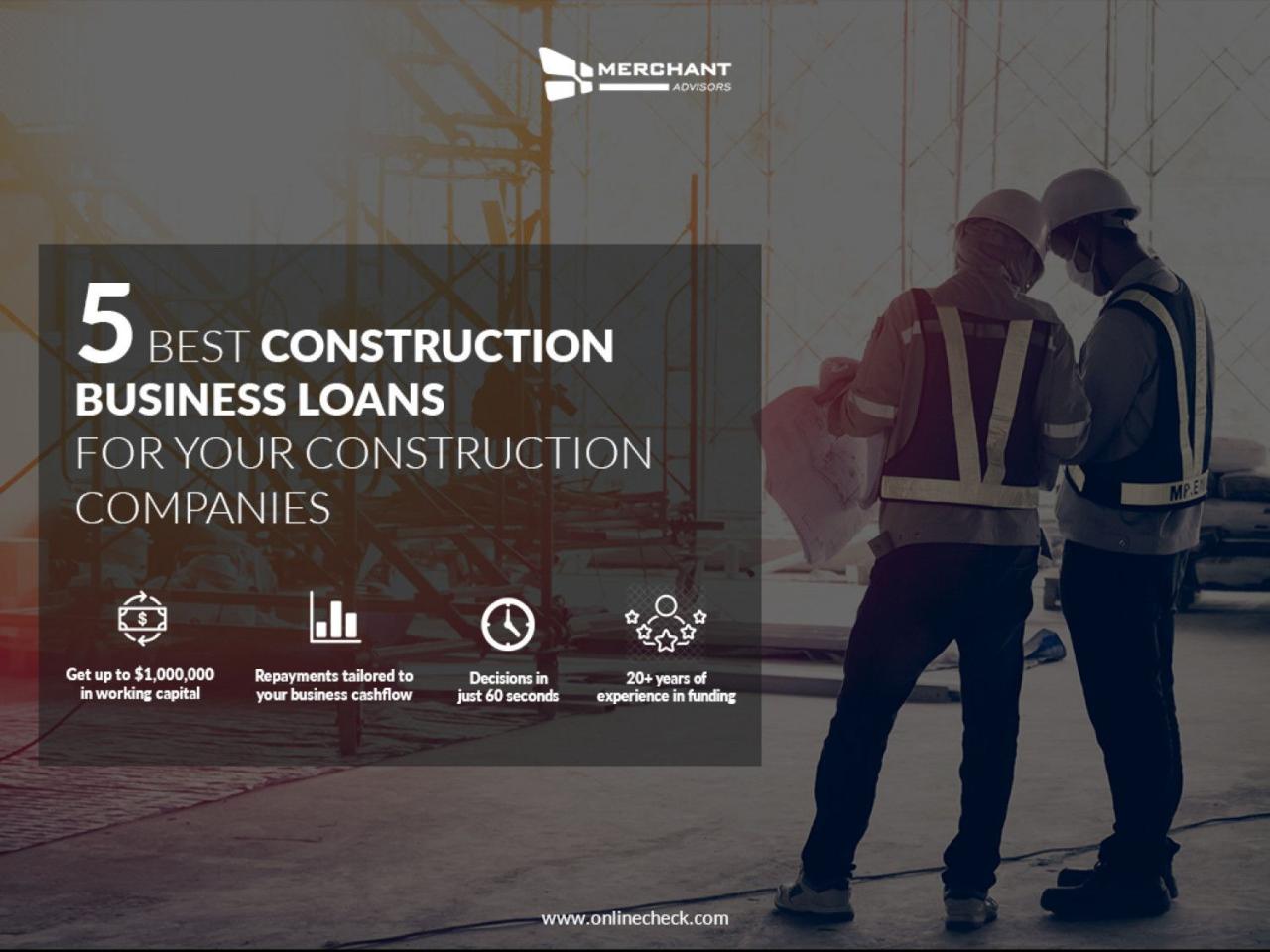Exploring Business Credit Options for Construction Companies

Delving into the realm of business credit options for construction companies, this introductory paragraph aims to provide an enticing glimpse into the world of financial possibilities in the construction industry.
The subsequent paragraph will offer a detailed look at the various aspects of business credit options available to construction companies.
Table of Contents
ToggleBusiness Credit Options for Construction Companies
Establishing business credit is crucial for construction companies as it allows them to access funds for projects, purchase materials, and manage cash flow effectively.
Types of Business Credit Options
- Business Line of Credit: Provides flexibility for ongoing expenses and projects.
- Business Credit Cards: Convenient for small purchases and building credit history.
- Equipment Financing: Helps in acquiring machinery and tools for construction projects.
- Vendor Credit: Allows companies to buy materials on credit from suppliers.
Requirements and Eligibility Criteria
Construction companies need to demonstrate a steady revenue stream, good credit history, and a solid business plan to qualify for business credit. Lenders may also consider the company's industry experience and project pipeline.
Benefits and Drawbacks of Using Business Credit
- Benefits:
- Access to funds for projects without tapping into personal finances.
- Improves cash flow management and provides financial flexibility.
- Builds a credit history that can lead to better financing terms in the future.
- Drawbacks:
- Accrued interest and fees can increase project costs.
- Defaulting on payments can damage the company's credit score and reputation.
- Over-reliance on credit may lead to financial strain if not managed properly.
Traditional Financing Methods
Traditional financing methods play a crucial role in the construction industry, providing construction companies with the necessary funds to undertake projects and grow their businesses. In this section, we will compare and contrast traditional bank loans with business credit options for construction companies, explore examples of traditional financing methods commonly used in the construction sector, and explain how construction companies can leverage traditional financing to fund projects.
Bank Loans vs. Business Credit Options
When it comes to traditional financing, construction companies often rely on bank loans as a primary source of funding. Bank loans typically offer lower interest rates and longer repayment terms compared to business credit options, making them a more cost-effective choice for larger construction projects.
On the other hand, business credit options such as lines of credit or equipment financing provide more flexibility and quicker access to funds, making them ideal for smaller, short-term projects.
Examples of Traditional Financing Methods
| 1. Construction Equipment Financing | 2. Real Estate Development Loans |
| 3. Business Lines of Credit | 4. Construction Project Loans |
Construction companies often utilize these traditional financing methods to secure the necessary funds for purchasing equipment, acquiring real estate for development projects, maintaining cash flow through lines of credit, and funding specific construction projects.
Leveraging Traditional Financing for Projects
- Construction companies can leverage bank loans to finance large-scale projects such as building construction or infrastructure development.
- Business lines of credit can be used to cover day-to-day operational expenses, purchase materials, or hire subcontractors for ongoing projects.
- Construction equipment financing allows companies to acquire or upgrade machinery and tools essential for completing construction projects efficiently.
Alternative Financing Solutions

When traditional financing methods may not be sufficient for construction companies, alternative financing solutions such as lines of credit, equipment financing, and invoice factoring can provide the necessary funds to support growth and operations.
Lines of Credit
- Lines of credit offer flexibility in borrowing money as needed, allowing construction companies to access funds quickly for various expenses.
- Interest rates on lines of credit can be higher than traditional loans, leading to increased costs over time.
- Case Study: XYZ Construction utilized a line of credit to purchase materials for a large project, enabling them to complete the work on time and within budget.
Equipment Financing
- Equipment financing allows construction companies to acquire machinery and tools without a large upfront payment, spreading the cost over time.
- Monthly payments for equipment financing can impact cash flow, especially during slower periods of business.
- Success Story: ABC Builders used equipment financing to upgrade their fleet, improving efficiency and winning larger contracts as a result.
Invoice Factoring
- Invoice factoring involves selling accounts receivable to a third party at a discount, providing immediate cash flow for construction companies.
- The fees associated with invoice factoring can be higher than other financing options, reducing overall profitability.
- Case Study: DEF Contractors utilized invoice factoring to bridge gaps in cash flow between project payments, allowing them to take on more projects simultaneously.
Building and Maintaining Business Credit

Establishing and maintaining a strong business credit profile is crucial for construction companies to access better credit options and financing solutions. By following best practices and improving creditworthiness, construction businesses can enhance their financial stability and growth prospects.
Steps to Establish and Build Strong Business Credit
- Register Your Business: Ensure your construction company is properly registered with the relevant authorities to establish a separate legal entity.
- Obtain a Federal Tax ID: Apply for an Employer Identification Number (EIN) from the IRS to separate personal and business finances.
- Open a Business Bank Account: Maintain a separate business account to track financial transactions and build a banking relationship.
- Obtain Business Credit Cards: Use business credit cards responsibly to establish credit history and improve creditworthiness.
- Make Timely Payments: Pay bills and credit obligations on time to demonstrate reliability and trustworthiness to creditors.
Best Practices for Maintaining a Good Business Credit Score
- Monitor Credit Reports: Regularly review business credit reports to identify errors or discrepancies and take necessary steps to correct them.
- Control Credit Utilization: Keep credit card balances low and avoid maxing out credit limits to maintain a healthy credit utilization ratio.
- Diversify Credit Types: Utilize a mix of credit products such as loans and lines of credit to showcase credit management skills.
- Establish Trade References: Build relationships with suppliers and vendors who report payment history to credit bureaus to enhance credit profile.
Tips to Improve Creditworthiness for Construction Companies
- Build Strong Vendor Relationships: Establish trust and reliability with suppliers to negotiate favorable credit terms and improve cash flow management.
- Invest in Technology: Implement efficient accounting systems and project management tools to streamline operations and demonstrate financial stability to lenders.
- Showcase Project Success: Highlight successful construction projects and client testimonials to showcase expertise and attract potential investors or lenders.
- Seek Professional Advice: Consult with financial advisors or credit experts to develop a strategic plan for improving creditworthiness and accessing better credit options.
Last Recap

Concluding our discussion on business credit options for construction companies, this final paragraph will encapsulate key points and insights in a compelling manner.
FAQ Resource
What is the significance of establishing business credit for construction companies?
Establishing business credit is crucial for construction companies as it helps separate personal and business finances, build credibility, and access better financing options.
Can construction companies benefit from alternative financing solutions like lines of credit?
Yes, construction companies can benefit from lines of credit as they provide flexibility in accessing funds for projects and managing cash flow effectively.
How can construction companies improve their creditworthiness to access better credit options?
To improve creditworthiness, construction companies can pay bills on time, reduce debt, monitor credit reports, and maintain a positive payment history.
Related posts
How to Get Business Credit for Roofing Company: A Comprehensive Guide
Featured Posts
- Exploring Xfinity Business WiFi Packages for Contractors
- Exploring Business Credit Options for Construction Companies
- Xfinity Business Internet Review for Small Business: A Comprehensive Guide
- Crafting the Right Protection: Biberk General Liability Insurance for Roofers
- The Best Business Line of Credit for Contractors
Popular Tags
banking (2) Biberk business insurance (1) biberk insurance (2) business account (2) business banking (2) business checking (1) business credit (8) business financing (2) business insurance application (1) business protection (1) cash flow management (1) construction industry (2) construction LLCs (1) Contractors (2) credit building (1) financial management (9) financial strategies (1) growth opportunities (1) home improvement companies (1) insurance premiums (1) insurance reviews (1) insurance tips (1) liability coverage (2) risk management (1) siding company (2) small business (3) small business insurance (2)

